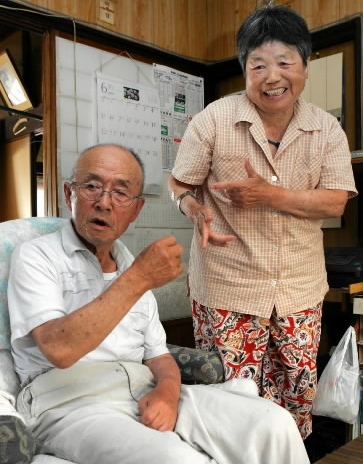The Silent Blast: The Atomic Bombing and the Deaf, Part 4
Jul. 1, 2010
Learning to sign and finally sharing her experience
by Yoko Kinomoto and Kenichiro Nozaki, Staff Writers
The atomic bomb wrought unprecedented destruction 60 years ago. [This series was first published in July 2005.] But some of the residents of Hiroshima were unable to hear the tremendous blast. The bewildering devastation of the bombing was silently scored into the memories of deaf survivors. These survivors have lived their post-war days under a cloud of frustration, incapable of conveying verbally what they experienced. According to a group which recognizes the deaf victims of the atomic bomb, about 140 deaf people were exposed to the blast, but less than 50 are still alive today. The Chugoku Shimbun interviewed five deaf survivors through sign language interpreters to trace what they experienced on August 6, 1945 and in the bombing's aftermath.
Tokiwa Inoue, 78, a resident of Ajisu-cho, Yamaguchi Prefecture
The couple take turns, talking about what happened as if they had experienced that day together. "The house collapsed," Tokiwa Inoue said, "and while I was running toward the air raid shelter…" As soon as she paused in her signing, her husband Hiroshi, 82, continued, "The street was full of dead bodies, and she had to avoid stepping on them."
Hiroshi, who is also deaf, has been the only person Tokiwa can share her experience with. Using the sign language she learned from him, she has told him her story, over and over.
For Tokiwa, the summer 60 years ago was filled with cruel sights. That time, the midsummer after she graduated at the age of 18 from a school for the deaf, became a memory she tried to erase from her mind.
It was August 6. She was holding a washboard in the bathroom of her house in Naka Ward, Hiroshima, when she "felt from vibrations in the air that something extraordinary had occurred." The next moment, a tremendous blast shattered the walls and window panes. She escaped injury, but her mother, who was sewing a kimono, suffered a gash on the head from the broken glass of the skylight.
A cloud of dust darkened the inside of the house and she lost sight of her mother for a moment. "Mom!" she cried out, even though she knew she would not be able to hear her mother's voice if she answered. "I was desperate," Tokiwa recalls. "Because I'm deaf, I didn't think I could live without my mother." She tied her mother's bleeding head with a towel, and they dashed out of the house together.
It still pains her to recall what she witnessed on the way to the air raid shelter two kilometers from her house: charred bodies, the injured with their skin peeling away from their faces and their arms swollen, people who had jumped into rivers and drowned. One of her neighbors was walking when blood suddenly spurted out from under her arm. She fell down and died.
Although she wished to forget the experience, it was not about any reluctance to tell others what she had witnessed. There were reasons she could not talk about it, despite having the desire.
In those days, schools for the deaf in Japan rigorously taught students to read the movement of the speaker's lips and to speak with their own voices. "The teachers would whip us if we used sign language," she said. Following the school's policy, she could not use sign language at home, either. Though she had no difficulty in everyday conversations, she could not communicate fully even with her much-loved mother.
In 1947, with the help of an acquaintance, she moved to Ube, Yamaguchi Prefecture, where she met Hiroshi, who took a leading role in establishing a group for the deaf in that city. She systematically learned sign language for the first time from him and "came to enjoy communicating my ideas to others."
At the age of 23, Tokiwa married Hiroshi. She could no longer contain her experiences inside. She talked about what happened around the time of the bombing in detail nearly every day for several years after they were married. Pouring out her emotions was something she had been unable to do before in speech. At the time of the bombing, Hiroshi was living in Shimonoseki, Yamaguchi Prefecture. But now he can talk about it as if he himself had experienced it. Pointing at her chest, Tokiwa signed, "I feel much lighter now."
The couple's son and daughter can hear and do not use sign language well. Tokiwa has told them very little about the atomic bombing. She understands the significance of conveying the horror of the atomic bomb and the importance of peace, but the lasting pain and language barrier still make it difficult for her to share her experiences of that summer to anyone other than her husband.
(Sign language interpreter: Akemi Ayagi)
(Originally published on July 20, 2005)








